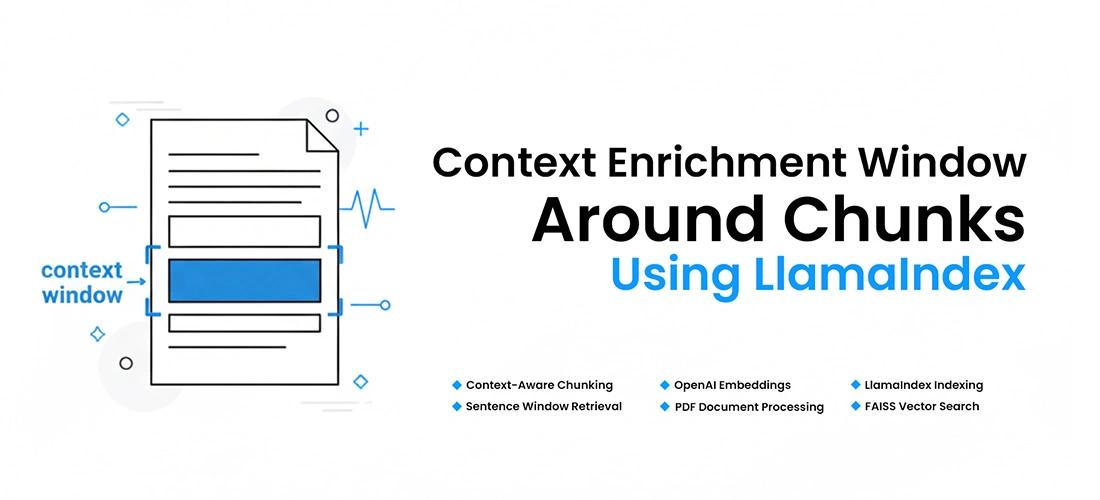Project Overview
This project builds an AI-powered document retrieval system using LlamaIndex, OpenAI GPT-4o, FAISS and metadata-based processing to enhance search accuracy. It begins with PDF processing and text chunking, ensuring structured document handling. The system then sets up FAISS as a vector store and utilizes OpenAI embeddings for efficient similarity-based search.
For improved relevance, the IngestionPipeline applies SentenceWindowNodeParser, capturing context windows around key sentences. A custom retrieval function ensures responses are enriched with meaningful context. Finally, a comparison between standard and context-enriched retrieval demonstrates the advantages of context-aware search, making the system highly effective for semantic search, knowledge management and AI-driven Q\&A applications.
Prerequisites
Before running this project, ensure you have the following:
- Python 3.8+ (for LlamaIndex and FAISS)
- Google Colab or Local Machine (execution environment)
- OpenAI API Key (for GPT-4o and embeddings)
- FAISS (for storing and retrieving vectors)
- LlamaIndex & Dependencies (install via pip)
- PDF Documents (for processing and retrieval)
Approach
This project follows a structured approach to building an AI-driven document retrieval system using LlamaIndex, OpenAI GPT-4o and FAISS. First, it installs and configures necessary dependencies, including FAISS for vector storage and OpenAI embeddings for semantic search. The system then loads PDF documents, processes them into sentence-level chunks and applies the SentenceWindowNodeParser to capture contextual information. These processed text chunks are converted into vector embeddings and stored in FAISS, enabling efficient similarity-based retrieval. When a user queries the system, the query engine searches for the most relevant document fragments and applies MetadataReplacementPostProcessor to ensure context-rich responses. This context-aware approach enhances the accuracy and relevance of retrieved information, making it ideal for semantic search, AI-driven Q\&A and knowledge retrieval applications.
Workflow and Methodology
Workflow
- Set up LlamaIndex, OpenAI, FAISS and other required libraries.
- Use SimpleDirectoryReader to read PDF files.
- Apply SentenceSplitter and SentenceWindowNodeParser to structure data.
- Convert text chunks into vector embeddings using OpenAIEmbedding.
- Save embeddings in a FAISS vector store for efficient retrieval.
- Build a VectorStoreIndex from processed document nodes.
- Use the query engine to find the most relevant document chunks.
- Apply MetadataReplacementPostProcessor to ensure context-aware responses.
- Print the retrieved document snippets along with their metadata.
Methodology
- Data Collection: PDFs are loaded and extracted for processing.
- Text Chunking: Documents are segmented into sentence-level windows to retain context.
- Vectorization: Each text chunk is converted into a numerical embedding using OpenAI.
- Storage & Indexing: Embeddings are stored in FAISS, optimizing similarity search.
- Query Execution: User queries are matched against stored embeddings for retrieval.
- Context Enhancement: Retrieved results are expanded with surrounding sentences for better comprehension.
- Information Retrieval: The final response provides the most relevant and context-rich document fragment.
Data Collection and Preparation
Data Collection
This project begins with data collection by reading PDF documents from a specified directory using SimpleDirectoryReader. The system ensures that only files with the pdf extension are loaded, making the process efficient. Once collected, the documents are converted into raw text for further processing.
Data Preparation Workflow
- Load PDF files using SimpleDirectoryReader.
- Extract text and convert it into a structured format.
- Segment text into smaller chunks with SentenceSplitter.
- Apply SentenceWindowNodeParser to retain context.
- Generate vector embeddings using OpenAIEmbedding.
- Store embeddings in FAISS for efficient retrieval.
